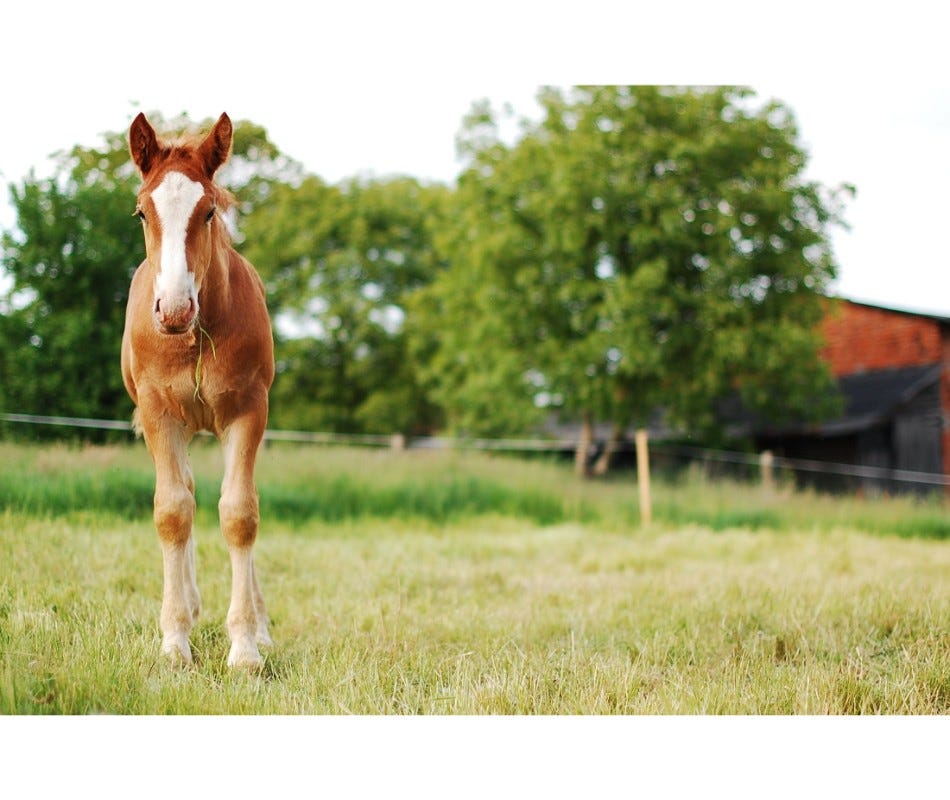We use cookies to make your experience better. To comply with the new e-Privacy directive, we need to ask for your consent to set the cookies. Learn more
Deworming Foals: Parasitic enemies to your Foal
Parasitic dangers Facing your foal
Parasites can bring different consequences to the health of an animal which can include poor growth, depression, colic, diarrhea, and nasal discharge. In severe cases it can even cause death to your animal.
The last thing you want for a new foal entering the world is to be infested with parasites.

How does a foal become infected by parasites?
A foal is very susceptible to being infected by the intestinal threadworm through ingestion of the mother’s milk which may be infected. A symptom of parasite infestation is chronic diarrhea in the foal. This can be remedied by deworming the broodmare during the pregnancy. Also a strategic deworming program during foaling can help minimize the transference of the larvae to the foal.
Common enemies - Roundworms
The most dangerous parasite to infect foals is the ascarid or roundworm. During their stages of development, the larvae of an ascarid travel to the foal’s lungs and liver which causes nasal discharge and fever and cough. These symptoms can also be mistaken for other respiratory diseases caused by bacteria or viruses and therefore parasite infection is not diagnosed. Once the parasites enter the small intestine of the foal they develop further. At this stage the fully mature parasite will cause health problems which can include peritonitis, diarrhea, and impaction colic.
Ideally, young foals should be given a dewormer during their 8th to 12th week that effectively targets ascarids. The results from fecal testing will determine the frequency of further deworming treatment. This could run every 8-10 weeks. You need to remain vigilant because some ascarids have become resistant to common anthelimintic agent such as ivermectin. Pyrantel pamoate and fenbendazole still remain the most effective treatment for roundworm infestation. Your vet can advise you what is the best deworming treatment based on testing of the foal’s feces.
Other enemies - Pinworms, Tapeworms & Strongyles
Foals have underdeveloped immune systems which make them susceptible to infestations by other types of parasites namely pinworms, tapeworms, and large strongyles. Once a foal has been weaned they should be dewormed on a regular basis. The ideal treatment should be around 2-3 months using anthelmintic agents that specifically work against tapeworms and large strongyles. Your local veterinarian will be able to help you design a program that targets and controls parasites specific to your foal.
Best use of Dewormers
After a period of time foals can also develop immunity against threadworms and ascarids. If the parasite infection becomes overwhelming medications should be used to treat the infection.
There are many deworming medications that are effective and safe to use on foals. Always read the label to correctly identify the active ingredient of the agent to ensure it is a safe product to use on a young horse. Determine the weight of the foal accurately in order to give the right. The treatment regime will depend on many factors such as stabling conditions, geographical location and climatic conditions.
Fenbendazole has shown to be very effective in targeting ascarids while ivermectin is known to be effective against strongyles. It is very important to observe the correct dosage for foals which can reduce the instance of drug resistance. Resistance to deworming medication has increased in recent years and has led horse owners to question which is the best deworming medication to use. This phenomenon usually results when incorrect dosages or frequency is inappropriate. Your veterinarian will help you assess the conditions in order to prescribe the correct treatment regime.
Environmental Control to Minimize Parasite Infections
Generally, an adult ascarid lays a substantial amount of eggs that are able to survive for about 8-10 years on the ground. Your foal will always be exposed to parasites because these disease-causing organisms are constantly in the pasture. Infections are minimized if your horse is healthy and maintained on a regular basis. The environment that you provide for your horse will play an important part in keeping parasites at bay and therefore - a healthy horse.
Here are some quick tips to remind you how to keep a clean environment for your horse.
- Help decrease egg and larvae transmission by routinely removing feces from your horse’s quarters.
- Do not dispose of manure near water or food supplies or on pastures.
- Harrow pastures to break up fecal lumps and expose them under intense heat to kill off larvae.
- New additions to your farm/stable – place them on quarantine until they have been tested
Veterinarian Advice - Deworming foals
Your veterinarian is the best source of information when it comes to the healthcare needs of your foal. Make your veterinarian a regular contact because they can provide you with the correct advice on the best deworming program for your foal.








Validate your login